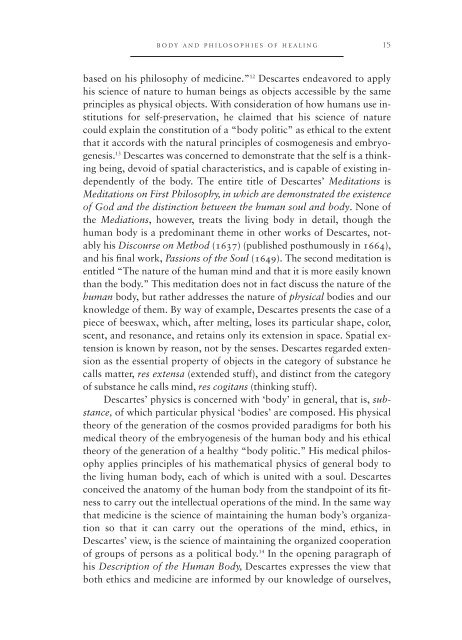body and health in yoga, Ayurveda, and Tantra
body and health in yoga, Ayurveda, and Tantra
body and health in yoga, Ayurveda, and Tantra
Create successful ePaper yourself
Turn your PDF publications into a flip-book with our unique Google optimized e-Paper software.
ody <strong>and</strong> philosophies of heal<strong>in</strong>g 15<br />
based on his philosophy of medic<strong>in</strong>e.” 12 Descartes endeavored to apply<br />
his science of nature to human be<strong>in</strong>gs as objects accessible by the same<br />
pr<strong>in</strong>ciples as physical objects. With consideration of how humans use <strong>in</strong>stitutions<br />
for self-preservation, he claimed that his science of nature<br />
could expla<strong>in</strong> the constitution of a “<strong>body</strong> politic” as ethical to the extent<br />
that it accords with the natural pr<strong>in</strong>ciples of cosmogenesis <strong>and</strong> embryogenesis.<br />
13 Descartes was concerned to demonstrate that the self is a th<strong>in</strong>k<strong>in</strong>g<br />
be<strong>in</strong>g, devoid of spatial characteristics, <strong>and</strong> is capable of exist<strong>in</strong>g <strong>in</strong>dependently<br />
of the <strong>body</strong>. The entire title of Descartes’ Meditations is<br />
Meditations on First Philosophy, <strong>in</strong> which are demonstrated the existence<br />
of God <strong>and</strong> the dist<strong>in</strong>ction between the human soul <strong>and</strong> <strong>body</strong>. None of<br />
the Mediations, however, treats the liv<strong>in</strong>g <strong>body</strong> <strong>in</strong> detail, though the<br />
human <strong>body</strong> is a predom<strong>in</strong>ant theme <strong>in</strong> other works of Descartes, notably<br />
his Discourse on Method (1637) (published posthumously <strong>in</strong> 1664),<br />
<strong>and</strong> his f<strong>in</strong>al work, Passions of the Soul (1649). The second meditation is<br />
entitled “The nature of the human m<strong>in</strong>d <strong>and</strong> that it is more easily known<br />
than the <strong>body</strong>.” This meditation does not <strong>in</strong> fact discuss the nature of the<br />
human <strong>body</strong>, but rather addresses the nature of physical bodies <strong>and</strong> our<br />
knowledge of them. By way of example, Descartes presents the case of a<br />
piece of beeswax, which, after melt<strong>in</strong>g, loses its particular shape, color,<br />
scent, <strong>and</strong> resonance, <strong>and</strong> reta<strong>in</strong>s only its extension <strong>in</strong> space. Spatial extension<br />
is known by reason, not by the senses. Descartes regarded extension<br />
as the essential property of objects <strong>in</strong> the category of substance he<br />
calls matter, res extensa (extended stuff), <strong>and</strong> dist<strong>in</strong>ct from the category<br />
of substance he calls m<strong>in</strong>d, res cogitans (th<strong>in</strong>k<strong>in</strong>g stuff).<br />
Descartes’ physics is concerned with ‘<strong>body</strong>’ <strong>in</strong> general, that is, substance,<br />
of which particular physical ‘bodies’ are composed. His physical<br />
theory of the generation of the cosmos provided paradigms for both his<br />
medical theory of the embryogenesis of the human <strong>body</strong> <strong>and</strong> his ethical<br />
theory of the generation of a <strong>health</strong>y “<strong>body</strong> politic.” His medical philosophy<br />
applies pr<strong>in</strong>ciples of his mathematical physics of general <strong>body</strong> to<br />
the liv<strong>in</strong>g human <strong>body</strong>, each of which is united with a soul. Descartes<br />
conceived the anatomy of the human <strong>body</strong> from the st<strong>and</strong>po<strong>in</strong>t of its fitness<br />
to carry out the <strong>in</strong>tellectual operations of the m<strong>in</strong>d. In the same way<br />
that medic<strong>in</strong>e is the science of ma<strong>in</strong>ta<strong>in</strong><strong>in</strong>g the human <strong>body</strong>’s organization<br />
so that it can carry out the operations of the m<strong>in</strong>d, ethics, <strong>in</strong><br />
Descartes’ view, is the science of ma<strong>in</strong>ta<strong>in</strong><strong>in</strong>g the organized cooperation<br />
of groups of persons as a political <strong>body</strong>. 14 In the open<strong>in</strong>g paragraph of<br />
his Description of the Human Body, Descartes expresses the view that<br />
both ethics <strong>and</strong> medic<strong>in</strong>e are <strong>in</strong>formed by our knowledge of ourselves,



